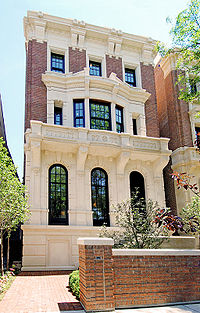Luxury home real estate
Definition
The characteristics that define luxury real estate differ among countries. However, location largely defines the property's value, especially with respect to whether it offers views (particularly, waterfront ones) or amenities such as proximity to golf courses, school districts, and the downtown district. Thus, a 750-square-foot (70 m2) waterfront home with less than 1-acre (4,000 m2) of property might be worth more than a 10,000-square-foot (930 m2) mansion with 10 acres (40,000 m2) of property.Luxury real estate is often defined as real property that has an appraised value of over $1 million in the United States, yet this varies greatly depending on the location. The classification also takes into account the presence of surrounding homes, amenities, views, waterfronts, absence of crime-rate, industrialization or unwanted commercialization, customizations of the home, and historical or architectural significance.
Differences from ordinary real estate
Luxury real estate entails greater responsibility for agents who handle transactions than ordinary real estate. They must advertise to a national audience to attract non-local buyers, whereas ordinary real estate only generally requires exposure in local media. There are also greater legal responsibilities for the luxury estate agent, which often involve attorneys, trusts, and anonymity issues. Buyers often require more inspections than with ordinary real estate (which are generally bought after a single inspection).Luxury real estate magazines
Companies operating in the luxury real estate market often publish their own magazines online and in print, meant to publicize their brands. Examples include Christie's Great Estates magazine, published by Christie's Great Estates, the real estate division of Christie's auction house, Previews magazine, published by Coldwell Banker, and the Robb Report.
source


